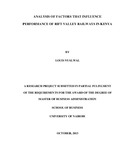| dc.description.abstract | This research was designed as a case study on Rift Valley Railways in Kenya. The objective of this study was to determine the factors influencing performance of Rift Valley Railways Ltd. In order to meet this objective pertinent primary data was collected through administration of an in-depth interview guide to 11 senior and middle level managers at RVR. The collected data was then analyzed through the use content analysis technique. The study identified and documented specific factors that need to be addressed such as the competitor, pricing, volume haulage threshold in tonnages, financing, technology, staff motivation and remuneration, government support in terms of finance and legislative support among others. The study explored the history of the railway from inception in late 1890‟s and traced its journey to the reason that culminated to the divestiture by the Government through Concession model. The Concession model is a form of divestiture where the government partners with the private sector, especially at an international level with experience in the rail industry. The government retains ownership of rolling stock and permanent way but leases to a private investor or consortium for period of 25years. The researcher was able to identify several factors that played a big role in the poor performance in the transport company. This largely revolved around the shortage or lack of investment in critical aspects of the business which eventually had domino effect in other activities such as service delivery and human resource. The respondents pointed out the main threat as the road and thus have to integrate technology and focus their activities to be customer oriented in order to counter the loss of cargo to the former. The researcher also noted the lack of clear guidelines in terms of formulating the rates (pricing) and what volumes are critical in a monthly or yearly to sustain the business. This is a pointer that there may or may not exist a policy guideline that is cascaded to the middle management who formed the bulk of the respondents. The support of the Government was also noted to be of critical importance. Railway is a monopoly that requires government supervision as it‟s a critical sector in the economy that can determine the price of essential goods. It is therefore in the interest of the Government to ensure that the sector is supported fully. It has been concluded that the company needs to re-examine its human compensation policies. Literature emphasizes that there is a relationship between compensation and commitment. Adequacy of compensation will lead to an increased desire to protect company assets and reduce loss of revenue. Employees are also less likely to seek more lucrative engagements. Generally speaking the management has to re-examine its planning policies and factor in customer focus. The top management has been blamed for failing to give guidance on strategic direction. The company as a result still operates like a government department where the client can be held at ransom for lack of alternatives. For a long time, it was established that RVR remained without any serious competitor in relation to bulk long haulage. The current sources of competition namely road trucks have made it very difficult for RVR to enjoy the near monopoly status it used to some years ago. | en |

